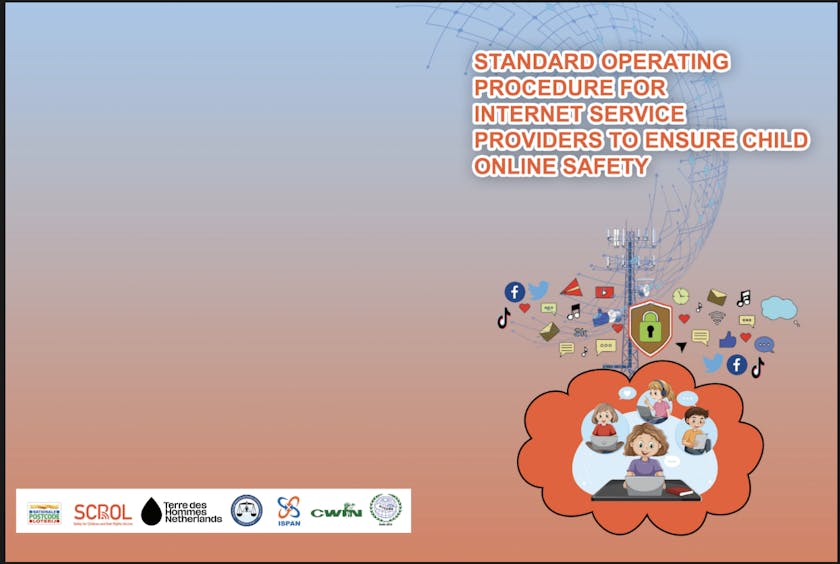Embedding Child Rights in Nepal’s Internet Services
“I can see incremental changes among internet service providers in Nepal,” states Suvash Khadka, CEO of the Internet Service Provider Association of Nepal (ISPAN)
This progress is the direct result of a strategic partnership. Terre des Hommes Netherlands, through the Safety for Children and their Rights OnLine (SCROL) Project, joined forces with ISPAN to make online child protection a mandatory operational duty. This collaboration successfully integrated child safety into the core operations of the country’s connectivity providers.
“ISPAN is majorly functioning for ISPs in terms of policy building, policy lobbying, functional and operational part of ISPs and the internet ecosystem for Nepal,” stated Mr Khadka. This strategic position allows ISPAN to maintain a crucial balance between consumers, service providers, and regulators—a middle ground essential for building effective policy and ensuring the internet ecosystem serves all users, especially children.
💻 Evidence Leads to Action
A major barrier was the lack of actionable, country-specific data on the trends of Online Child Sexual Exploitation (OCSE). The SCROL Project, alongside local partners—Centre for Legal Research and Resource Development (CeLRRd) and Child Workers in Nepal (CWIN)—stepped in to gather the vital insights ISPs needed.
“The role of the SCROL project was like, there are small and small pieces of information that needs to be brought into the table, into the conference room,” Mr. Khadka highlighted, emphasizing the SCROL Project’s role in synthesising this information and making it actionable: “That gives us a very inside picture, like, how the threats are originated, who are the perpetrators, and in what capacity these things are being spread in the ecosystem. So, that gives us an opportunity to understand the problem, the scenario.”
These insights were essential. They enabled ISPs to move beyond generic security measures towards design-focused, evidence-based child protection interventions. Our capacity-building programmes, including seminars and conferences, were the primary venue for sharing this strategic knowledge across the industry.
🛡️ Establishing Industry Responsibility
The partnership has delivered significant results, establishing a new benchmark for industry responsibility in Nepal:
- Standard Operating Procedures (SOPs): ISPAN, supported by SCROL, successfully developed and introduced clear Standard Operating Procedures for ISPs to manage and report child online safety issues. These SOPs formalise the industry’s mandatory response to online harms, providing a crucial, clear protocol for protection that all members must follow.
- Child Safety Products: Leading ISPs, including Classic Tech, Vianet, WorldLink, and Subisu, have launched innovative “safe net” packages (such as Safe Net and Bi-Secure). These market-based products offer enhanced parental controls and child safety features, directly demonstrating a commitment to protection.
- Awareness Campaigns: Leveraging ISP customer networks, the awareness campaign achieved large-scale outreach, directly educating customers and communities on online safety risks and best practices.
- Regulatory Collaboration: The initiative has led to the formation of a formal committee with the regulatory body, the Nepal Telecommunications Authority (NTA), establishing a dedicated high-level channel for addressing systemic issues.
 Go to https://int.terredeshommes.nl/uploads/fe4f6b01-standard-operating-procedure-for-isps-nepal.pdf
Go to https://int.terredeshommes.nl/uploads/fe4f6b01-standard-operating-procedure-for-isps-nepal.pdf
Now with that SOP (Standard Operating Procedure), even the small ISPs (Internet Service Providers) can see what are the checklists to do. And what they need to do and what they need to follow.
— Suvash Khadka, CEO of the Internet Service Provider Association of Nepal (ISPAN)
🌐 Systemic Impact: Securing National Policy
Beyond the ISP sector, our systemic approach has achieved a critical national policy milestone. Our continued advocacy ensured that Online Child Protection was formally included in the 16th National Plan of Action of the Government of Nepal, solidifying a multi-sectoral, high-level commitment to the issue across government institutions.

Way Forward
The foundational achievements of the SCROL-ISPAN partnership set the stage for crucial next steps to fully secure Nepal’s digital space. “It wouldn’t have been possible without the joint synergy or joint initiative of SCROL Project itself,” acknowledged Suvash Khadka, CEO of ISPAN.
The next milestone that we’ll have is how many of ISPs (Internet Service Providers) are really implementing these SOPs (Standard Operating Procedures) and are there any challenges or difficulties to implement that SOPs (Standard Operating Procedures) or not.
— Suvash Khadka, CEO of the Internet Service Provider Association of Nepal (ISPAN)
Terre des Hommes Netherlands is committed to sustaining this unique collaboration. We are now focused on solving two key systemic challenges: ensuring rigorous government compliance on pending policy documents and driving the Content Delivery Network Provider (CDNPAC) initiative. Additionally, we are closely monitoring the next milestone: rigorously tracking the implementation of the SOPs across all ISPs and tackling any challenges that arise during their operational use.
The CDNPAC initiative specifically aims to bring major global content providers (like Google) into a formal framework for enhanced service delivery and unified law enforcement collaboration. With a clear 1-to-2 year timeline, we are working to fully implement the necessary policies and capacities to uphold every child’s right to a healthy, safe, and secure digital environment in Nepal.






